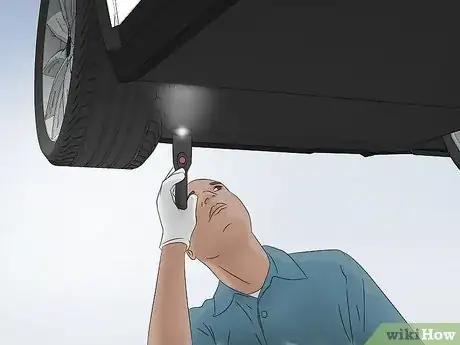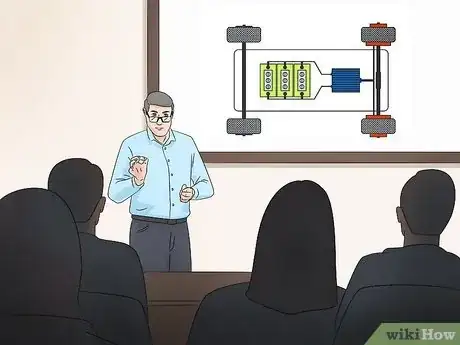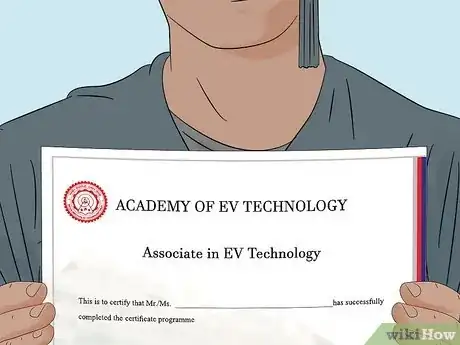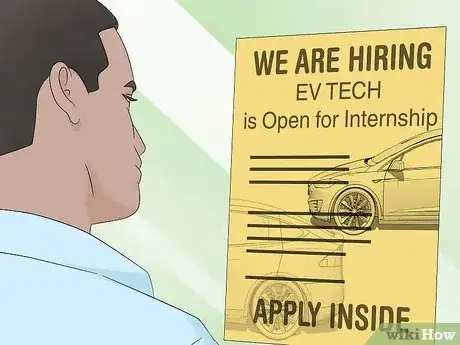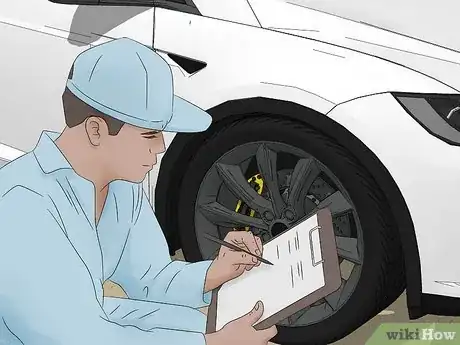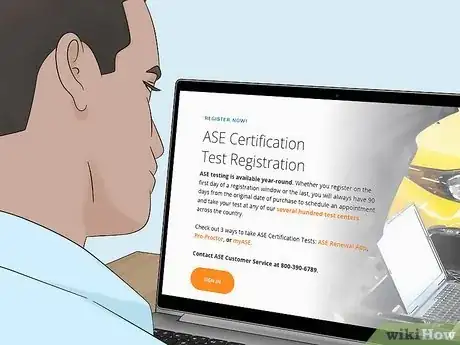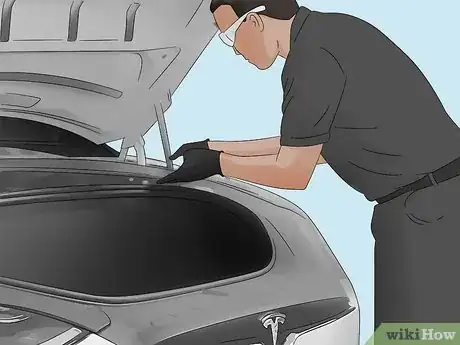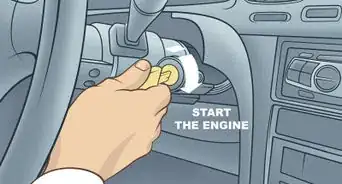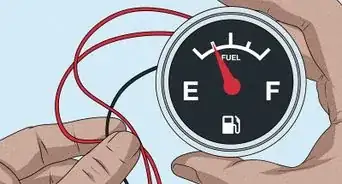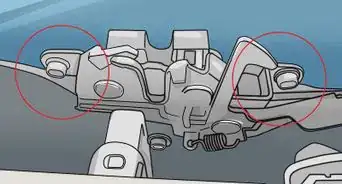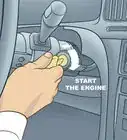This article was co-authored by wikiHow staff writer, Eric McClure. Eric McClure is an editing fellow at wikiHow where he has been editing, researching, and creating content since 2019. A former educator and poet, his work has appeared in Carcinogenic Poetry, Shot Glass Journal, Prairie Margins, and The Rusty Nail. His digital chapbook, The Internet, was also published in TL;DR Magazine. He was the winner of the Paul Carroll award for outstanding achievement in creative writing in 2014, and he was a featured reader at the Poetry Foundation’s Open Door Reading Series in 2015. Eric holds a BA in English from the University of Illinois at Chicago, and an MEd in secondary education from DePaul University.
There are 17 references cited in this article, which can be found at the bottom of the page.
This article has been viewed 66,967 times.
Learn more...
Electronic vehicle (EV) technicians are on the cutting edge of a promising market with a ton of future growth. Regardless of whether you have experience working on vehicles or not, anyone with drive and determination can break into this field as a mechanic. Since traditional mechanics don’t know how to service solid-state batteries and electric engines, you’ll have the upper edge finding highly profitable work if you get the training you need to work on electric vehicles. In this article, we’ll break down everything you need to know about becoming an EV technician.
Steps
What qualifications do I need to become an EV mechanic?
-
1You need a GED or high school diploma to get started in the field. So long as you’re 18 and have a diploma, you’re good to go! It helps if you have experience working with vehicles, either as a dealer or a mechanic, but it's not mandatory.[1]
- While the batteries and motors are electric in an EV, a lot of the underlying principles are the same when it comes to electronic and traditional vehicles. That’s where the automotive experience helps.
-
2You need EV training and experience to become a pro mechanic. You have a lot of options for getting the background and training you need to work in this field. EV mechanics are in high demand, so you may not need to earn a college degree or certification to get started.[2]
How do I get the proper training to become an EV mechanic?
-
1Sign up for an EV training program at a trade school. There are electronic vehicle training programs at trade schools where you’ll learn everything you need to know about working on EVs. These intensive programs could be anywhere between 2 to 24 weeks long. This route is usually the fastest way to get qualified and find work in the field.[3]
- The Universal Technical Institute is a popular trade school that has an electric vehicle technician training program.
- Training programs typically cost at least a few hundred dollars; it depends a lot on how long and in-depth they are.
- EV manufacturers usually offer their own specialized courses to train mechanics on their vehicles. These programs are often free, but you typically need to be licensed mechanic to take them.[4]
-
2Earn an associate’s degree in EV technology. If you want an in-depth education as an EV technician, enroll at a local community college that offers a degree in electronic vehicle technology. These programs take 1-2 years to complete, and you’ll learn everything you need to know to become an EV technician.[5]
-
3Look into internships or apprenticeships to skip the classroom. If you’re new to the field and you know you want to work as an EV mechanic but you want on-site training, look for an internship/apprenticeship with an EV manufacturer, mechanic, or dealer near you. Read the qualifications on postings carefully to see if you can find something that offers on-site training.[8]
- Many internships and apprenticeships are paid positions. There's such a huge need for EV technicians that these companies will bend over backwards to get you into the field.[9]
-
4Get an entry-level job at a dealership that sells EVs. Many companies that make gas-powered cars also sell EVs. As the market shifts from gas to electric vehicles, these companies need to train a ton of new technicians. If you can get your foot in the door at a dealership for a company that sells hybrids or EV vehicles, it's likely that you'll eventually be trained to work on EVs.[10]
- Audi, BMW, Ford, Volkswagen, GM, Nissan, Hyundai, Volvo, and Mercedes-Benz all sell EVs in addition to their traditional ICE vehicles.
Community Q&A
-
QuestionIs it possible to find remote learning for these courses?
 wikiHow Staff EditorThis answer was written by one of our trained team of researchers who validated it for accuracy and comprehensiveness.
wikiHow Staff EditorThis answer was written by one of our trained team of researchers who validated it for accuracy and comprehensiveness.
Staff Answer wikiHow Staff EditorStaff AnswerFor most of the classroom training classes, yes. A lot of these programs offer virtual training. However, you'll have to complete some in-person training when it comes to the hands-on stuff.
wikiHow Staff EditorStaff AnswerFor most of the classroom training classes, yes. A lot of these programs offer virtual training. However, you'll have to complete some in-person training when it comes to the hands-on stuff. -
QuestionWhere would you go to find and apprenticeship for electric cars?
 wikiHow Staff EditorThis answer was written by one of our trained team of researchers who validated it for accuracy and comprehensiveness.
wikiHow Staff EditorThis answer was written by one of our trained team of researchers who validated it for accuracy and comprehensiveness.
Staff Answer wikiHow Staff EditorStaff AnswerThese positions are advertised online on job boards, just like normal full-time positions.
wikiHow Staff EditorStaff AnswerThese positions are advertised online on job boards, just like normal full-time positions.
References
- ↑ https://www.bls.gov/green/electric_vehicles/
- ↑ https://www.bbc.com/news/uk-wales-57056960
- ↑ https://www.repairerdrivennews.com/2022/02/24/uti-ford-team-up-to-offer-ford-ev-technician-training/
- ↑ https://insideevs.com/news/341281/here-is-how-volkswagen-trains-high-voltage-experts/
- ↑ https://pathways.riohondo.edu/program/electric-vehicle-and-fuel-cell-technology-technician-as/
- ↑ https://education.seattlepi.com/can-double-major-community-college-3012.html
- ↑ https://engineering.wayne.edu/electric-vehicle-program
- ↑ https://www.freep.com/story/money/cars/2018/07/25/general-motors-ford-internships/801334002/
- ↑ https://corporate.ford.com/careers/programs/students-and-recent-graduates/ford-summer-internship-program.html
- ↑ https://www.thedrive.com/news/44619/ford-dealers-will-finally-be-forced-to-learn-about-electric-vehicles
- ↑ https://www.ase.com/work-experience
- ↑ https://www.ase.com/test-series
- ↑ https://www.tesla.com/careers/search/job/start-program-technician-37373
- ↑ https://www.tradeschoolgrants.com/mechanic-schools/tesla-start-program/
- ↑ https://www.tesla.com/careers/search/job/pathway-to-start-program-83805
- ↑ https://www.cbtnews.com/the-auto-industry-is-changing-so-are-technicians/
- ↑ https://www.ziprecruiter.com/Salaries/Electric-Vehicle-Technician-Salary

